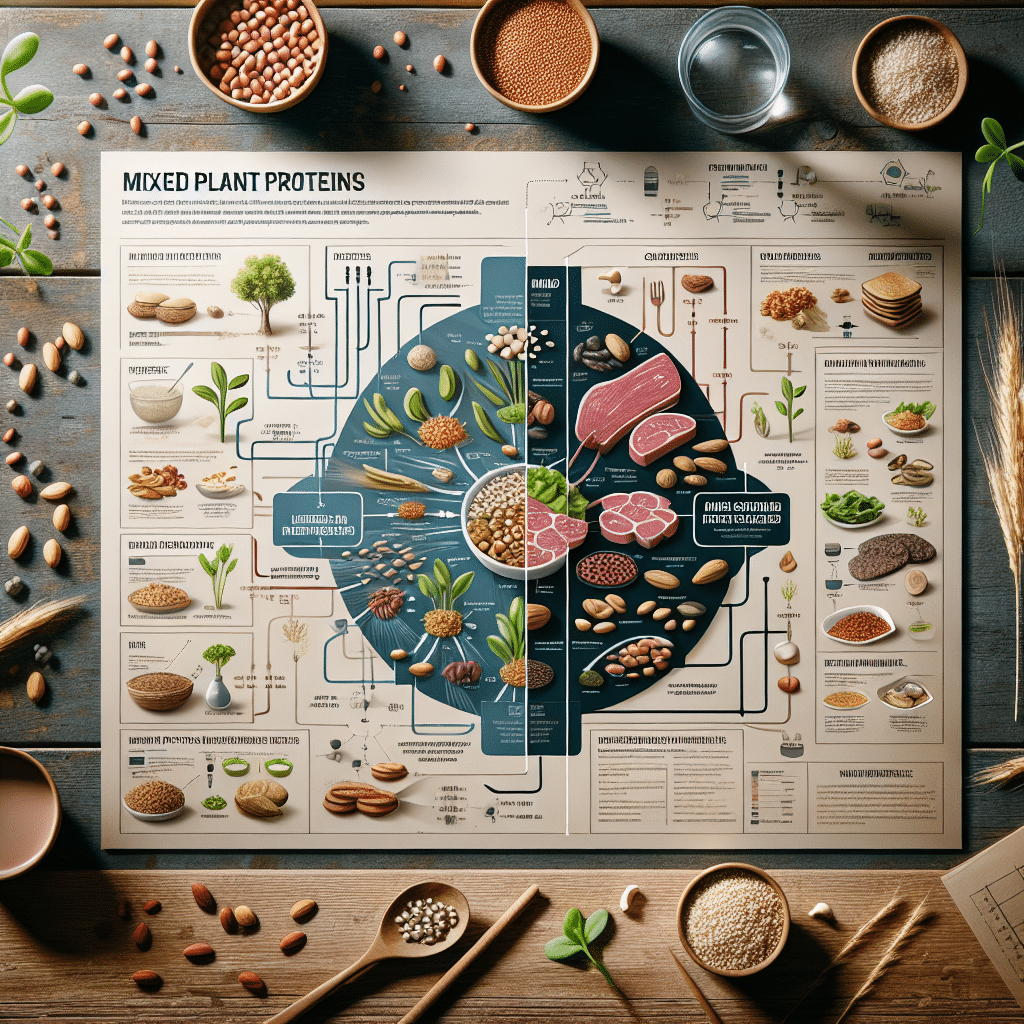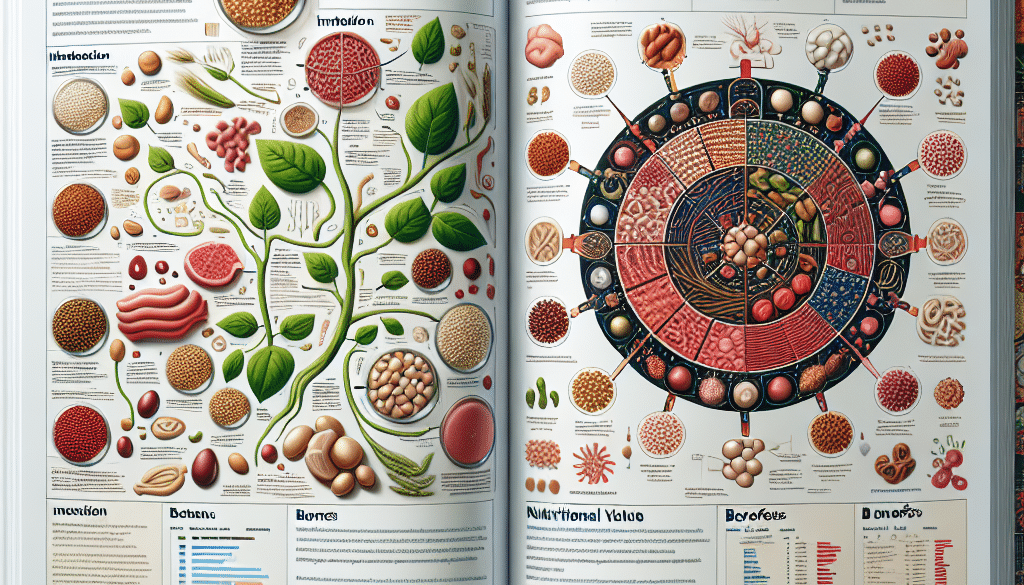Functional Properties of Mixed Plant Proteins: Ultimate Guide
-
Table of Contents
- Mixed Plant Proteins: The Ultimate Guide to Functional Properties
- Understanding Mixed Plant Proteins
- Nutritional Benefits of Mixed Plant Proteins
- Functional Properties of Mixed Plant Proteins
- Solubility
- Water and Fat Absorption
- Emulsification
- Gelation
- Foaming
- Applications of Mixed Plant Proteins
- Case Studies and Statistics
- Conclusion: Key Takeaways
- Discover ETprotein’s High-Quality Plant Proteins
Mixed Plant Proteins: The Ultimate Guide to Functional Properties

As the global population becomes increasingly health-conscious and environmentally aware, the demand for sustainable and nutritious food sources is on the rise. Mixed plant proteins have emerged as a powerhouse in the food industry, offering a plethora of functional properties that benefit both manufacturers and consumers. This comprehensive guide delves into the functional properties of mixed plant proteins, providing valuable insights into their versatility and benefits.
Understanding Mixed Plant Proteins
Mixed plant proteins are derived from various plant sources such as peas, rice, hemp, and soy. They are often combined to create a complete amino acid profile that mirrors that of animal proteins. This combination not only enhances the nutritional value but also improves the functional properties of the proteins.
Nutritional Benefits of Mixed Plant Proteins
- Complete Amino Acid Profile: By combining different plant proteins, it is possible to create a complete amino acid profile, which is essential for muscle growth and repair.
- Digestibility: Mixed plant proteins are often easier to digest than some animal proteins, making them a suitable option for individuals with sensitive digestive systems.
- Low Allergenic Potential: Plant proteins typically have a lower risk of causing allergic reactions compared to common allergens found in animal proteins like dairy and eggs.
Functional Properties of Mixed Plant Proteins
The functional properties of mixed plant proteins are what make them particularly appealing for food production. These properties include solubility, water and fat absorption, emulsification, gelation, and foaming. Each property plays a crucial role in the manufacturing process and the final product quality.
Solubility
Solubility is a key factor in beverage applications. Mixed plant proteins that are highly soluble can be easily incorporated into liquids without forming clumps or sediment, resulting in a smooth texture and consistent flavor.
Water and Fat Absorption
Water and fat absorption capabilities are important for products like baked goods and meat analogs. These properties help in moisture retention, which contributes to the juiciness and mouthfeel of the final product.
Emulsification
Emulsification is the ability to mix oil and water, which is essential in products like dressings and sauces. Mixed plant proteins can stabilize emulsions, ensuring a uniform texture and preventing separation.
Gelation
Gelation refers to the ability of proteins to form gels when heated. This property is crucial for creating meat-like textures in plant-based alternatives and for providing structure in dairy-free cheeses and yogurts.
Foaming
Foaming is important for products that require aeration, such as mousse and whipped toppings. Plant proteins that exhibit good foaming properties can trap air, resulting in a light and airy texture.
Applications of Mixed Plant Proteins
Mixed plant proteins have a wide range of applications in the food industry. Here are some examples:
- Plant-Based Meat Alternatives: Mixed plant proteins can mimic the texture and taste of meat, making them ideal for vegetarian and vegan products.
- Dairy-Free Products: They can be used to create dairy-free cheeses, yogurts, and milk that have similar textural properties to their dairy counterparts.
- Sports Nutrition: Plant proteins are popular in protein powders, bars, and ready-to-drink shakes for athletes and fitness enthusiasts.
- Bakery and Snacks: They can improve the nutritional profile and texture of baked goods and snacks.
Case Studies and Statistics
Several studies have highlighted the benefits of mixed plant proteins. For instance, a study published in the “Journal of Food Science” demonstrated that pea and rice protein blends provide a complete amino acid profile and enhanced protein quality. Additionally, market research indicates a growing trend in plant-based protein consumption, with the plant-based meat market projected to reach $35.4 billion by 2027, according to a report by MarketsandMarkets.
Conclusion: Key Takeaways
Mixed plant proteins offer a sustainable and nutritious alternative to animal proteins, with functional properties that make them highly versatile in food applications. Their ability to provide a complete amino acid profile, coupled with their digestibility and low allergenic potential, makes them an attractive option for consumers and manufacturers alike. The functional properties such as solubility, water and fat absorption, emulsification, gelation, and foaming contribute to the success of plant-based products in the market.
Discover ETprotein’s High-Quality Plant Proteins
If you’re looking for top-notch mixed plant proteins, ETprotein is your go-to source. Their extensive range of organic and non-GMO plant proteins, including rice, pea, pumpkin seed, and sunflower seed proteins, cater to various industry needs. With a focus on neutral taste and allergen-free attributes, ETprotein’s products are ideal for enhancing the functional properties of your food applications.
About ETprotein:
ETprotein, a reputable protein Chinese factory manufacturer and supplier, is renowned for producing, stocking, exporting, and delivering the highest quality organic bulk vegan protein and plant proteins. They include Organic rice protein, clear rice protein, pea protein, clear pea protein, pumpkin seed protein, sunflower seed protein, mung bean protein, peanut protein etc. Their offerings, characterized by a neutral taste, non-GMO, allergen-free attributes, cater to a diverse range of industries. They serve nutraceutical, pharmaceutical, cosmeceutical, veterinary, as well as food and beverage finished product distributors, traders, and manufacturers across Europe, USA, Canada, Australia, Thailand, Japan, Korea, Brazil, and Chile, among others.
ETprotein specialization includes exporting and delivering tailor-made protein powder and finished nutritional supplements. Their extensive product range covers sectors like Food and Beverage, Sports Nutrition, Weight Management, Dietary Supplements, Health and Wellness Products, and Infant Formula, ensuring comprehensive solutions to meet all your protein needs.
As a trusted company by leading global food and beverage brands and Fortune 500 companies, ETprotein reinforces China’s reputation in the global arena. For more information or to sample their products, please contact them and email sales(at)ETprotein.com today.














